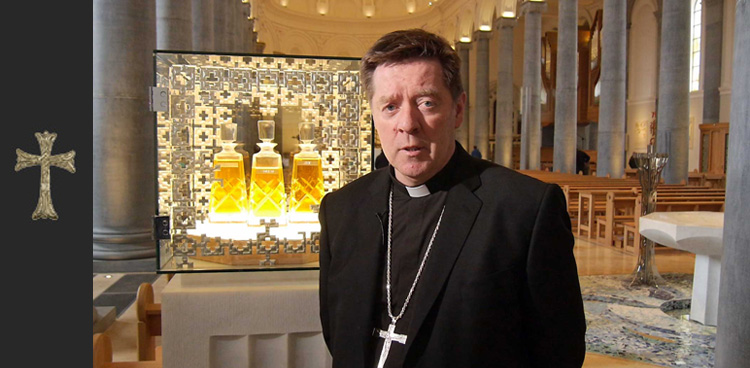Bishop Francis Duffy, Bishop of Ardagh and Clonmacnois, has issued a pastoral message to the faithful of the diocese, Life is both sacred and a human right. In his message, Bishop Duffy reflected on the value of human life and encourages families to choose life.
Bishop Duffy said, ‘I write to you concerning the proposal to remove the Eighth Amendment to the Constitution of Ireland (Article 40.3.3) in 2018. Because this is a positive and life affirming constitutional provision, and in response to those concerns expressed by members of the faithful, I strongly feel that this issue merits discussion from the perspective of Church teaching at this time.’
He continued, ‘Human life is sacred and begins at the moment of conception. Once it begins life should be allowed to flourish and to continue until its natural end. This is the view of the Catholic Church, of people of different faiths and by those who consider the protection of life as an issue of fundamental human rights.
‘The greatest gift that each person has is the gift of life, and the debate this year is all about human life. Before conception there is no human life; after conception there is human life: a unique and distinct human being has come into existence. This reality was put eloquently by Saint Pope John Paul II, “Right from fertilization the adventure of a human life begins, and each of its capacities requires time – a rather lengthy time – to find its place and to be in a position to act” (Evangelium Vitae, 60).
‘In the current discussion about human life some argue that abortion, in particular circumstances, is acceptable. Even if this suggestion comes from a sense of compassion, such a viewpoint runs counter to the culture of life which is cherished in Ireland, and for good reason. The truth is that nobody has the right to end the life of another. Abortion is the direct and intentional taking the life of the most vulnerable and innocent of human beings. It is never a medical treatment. Real compassion is not about a choice, it is about sustaining life.’
Reflecting on the words of the Eighth Amendment, Bishop Duffy went on to say, ‘Its removal will not serve the common good. Without the Eighth some lives, which are at an early stage of growth and development, will not be protected and therefore could be ended before birth. However by retaining the Eighth we, as a society, are not imposing a hierarchy of human rights where one life may be preferred over another. By retaining the Eighth Irish society is choosing life in the interest of this and of future generations.
‘In the midst of the current discussion we must ask: who can deny a vulnerable and innocent human being the right to breathe the air of our earth so that they can live life to the full?’
Bishop Duffy said, ‘Occasionally, in a pregnancy, medical intervention is required with the intention of saving the life of the mother. When this occurs it can result, sadly, in the unavoidable death of her unborn baby. Such a heart-breaking occurrence is not an abortion because the intention of the medical intervention was not to directly kill the unborn baby.
‘Every human life has a value regardless of its condition. When a pregnancy is particularly challenging and distressing for the mother, she and her baby deserve excellent medical care and support from family and friends. It is vital that mothers and fathers, who have been given a poor prognosis for their baby, are fully informed of the positive alternatives to keep their child and to allow dignity for all. The websites of One Day More and Every Life Counts offer helpful testimonies in this regard.
‘Sometimes life begins in the context of the heinous crime of rape. To help deal with this trauma and violation, it is essential that the mother receives love, accompaniment and appropriate support from family, friends and professionals. In such terrible circumstances an innocent human life, like any other, has begun. A child conceived following rape is still a person. He or she has rights, including that most fundamental of all rights, the right to life.’
He continued, ‘The Church’s opposition to abortion has been constant since the first century. Recently Pope Francis reiterated that teaching. He wrote, “I wish to restate as firmly as I can that abortion is a grave sin, since it puts an end to an innocent life”. Pope Francis followed up by reiterating the Church’s teaching on mercy:
‘“In the same way, however, I can and must state that there is no sin that God’s mercy cannot reach and wipe away when it finds a repentant heart seeking to be reconciled with the Father. May every priest, therefore, be a guide, support and comfort to penitents on this journey of special reconciliation” (Misericordia et Misera, 12).
‘The Pope’s words are reassuring about God’s mercy and forgiveness for those who regret having abortions and wish to be at peace with themselves and with the Lord. Pope Francis is saying that the Lord’s door is open, through the Sacrament of Reconciliation (Confession). There is always a way home to the Lord.’
Bishop Duffy concluded, ‘The right to life is the most fundamental right of all. Once human life begins it should be allowed to continue. I invite you and your family to pray that Ireland chooses life this year, and always:
Lord Jesus, you are the source and lover of life
Reawaken in us respect for every human life
Help us to see in each child the marvellous work of our Creator
Open our hearts to welcome every child as a unique and wonderful gift from God.
Amen.’
The full text of Bishop Duffy’s Pastoral Message can be found on www.catholicbishops.ie.
ENDS


